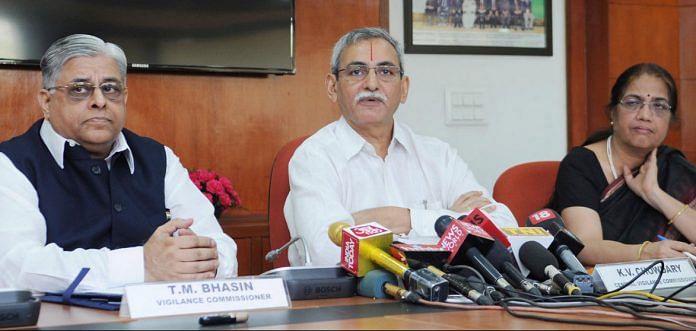Indian corporate sector loves retired bureaucrats, especially those who have held important posts in ‘ATM ministries’ – where serving bureaucrats have the power to grant favours to the private sector. And so it didn’t come as a surprise when former Central Vigilance Commissioner K.V. Chowdary landed a cushy, high-paying job with India’s biggest private-sector entity – Reliance Industries Limited – a little over four months after his retirement.
There is nothing illegal in Chowdary joining the board of Reliance Industries (RIL) as an independent director. But his appointment does highlight the need for urgent reforms in the Indian bureaucracy where a reasonable cooling-off period is mandatory before officials retiring as secretaries in important ministries or those part of a crucial government entity or regulator take up private work. The perception of bureaucrats making policies either for a quid pro quo or a post-retirement job is dangerous for governance.
Before joining the RIL, Chowdary was a director on the board of CCL Products (India) Ltd, a post he took up barely a month after demitting office as the head of India’s top anti-corruption watchdog.
While it is unreasonable to expect a complete bar on retired bureaucrats taking up new roles, there is certainly a need to ensure their post-retirement jobs are not seen as “reward” for work done by them while in office.
A former petroleum secretary landing a highly-paid job with a big private sector petroleum company soon after retirement can’t just be a coincidence. Or a former civil aviation secretary joining the board of directors of an airline company will raise some stink.
Bureaucrats have the right to supplement their income after retirement but their private sector associations immediately after being relieved from service will put a question mark on the work they did. This also invariably puts decisions made by those who follow these retired bureaucrats in their positions under suspicion.
In Chowdary’s case, let’s not forget that he was chairman, Central Board of Direct Taxes, at the time of his retirement and before he was appointed as the CVC.
Also read: How to work like IAS officer — lessons taught to 8 lateral entrants recruited by Modi govt
Retired bureaucrats a prized catch
As stated earlier, India Inc loves retired bureaucrats. Even if they haven’t doled out favours to anyone in particular, they remain a prized catch for something like a non-executive directorship.
Consider this report in ThePrint, for instance. As chairman of the Securities and Exchange Board of India (SEBI), retired IAS officer M. Damodaran was tasked with ensuring that companies followed all rules under the Companies Act and had the authority to penalise errant firms that flouted the law. After retiring, he became a non-executive member on the boards of corporate giants like Hero MotoCorp, Tech Mahindra, L&T, CRISIL and Biocon – the companies that are mandated to follow the SEBI rules got someone on their boards who knew how the rules and laws work.
Another former IAS officer U.K. Sinha, who too had a long stint at the SEBI, similarly landed on the directorial boards of Vedanta Ltd (a mining company) and Havells India.
Former Comptroller and Auditor General (CAG) Vinod Rai, whose controversial reports in the alleged scams in 2G spectrum and coal blocks allocations continue to be the talk of the town, was on the boards of Apollo Tyres and IDFC.
What helps the cause of retired bureaucrats in landing well-paying jobs in the private sector is the clause in the Companies Act, which says that firms must have at least 50 per cent “non-executive” directors on their boards.
Also read: How the Indian civil services continue to remain a boys’ club
What can be done?
To begin with, the government can ensure, through an executive fiat, that retired bureaucrats who have held regulatory assignments like CAG, CVC or chairperson/member of Competition Commission of India, Telecom Disputes Settlement and Appellate Tribunal (TDSAT), Telecom Regulatory Authority of India (TRAI), Income Tax Appellate Tribunal (ITAT), Pension Fund Regulatory and Development Authority (PFRDA) and Insurance Regulatory and Development Authority of India (IRDAI), etc, can’t take up regular or even part-time jobs like non-executive directorships immediately after demitting office.
In 2011, the Department of Personnel and Training (DoPT) decided to increase the cooling-off period for retired bureaucrats wishing to take up assignments in the private sector from one year to two years. But the move was scuttled.
There is a need to make it happen now, and fast.
Also, the government must ensure that all requests for waiving the mandatory cooling-off period, such as the one that the Narendra Modi government accepted for Foreign Minister S. Jaishankar to allow him to join the Tata Group immediately after his retirement as foreign secretary, are turned down. No amount of explanation or excuses can adequately address questions over the propriety of such exceptions being allowed.
But, since governments like to retain a stranglehold over their babus, the possibility of this happening is almost zero.
When he was Leader of the Opposition in the Rajya Sabha, BJP leader Arun Jaitley had said, “Pre-retirement judgements are influenced by post-retirement jobs.”
While Jaitley was making out a case for why retired judges must not get post-retirement jobs, his views hold true for bureaucrats as well.
After all, who can say with certainty that the decisions taken by a bureaucrat while in office were not aimed at landing a job after retirement?




The core competency of India Inc. is in managing the government and the bureaucracy. This is it’s result.
This is a particularly high visibility case.